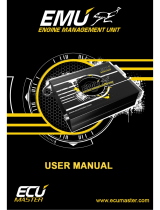
Protected by copyright. Copying for private or commercial purposes, in part or in whole, is not
permitted unless authorised by AUDI AG. AUDI AG does not guarantee or accept any liability
with respect to the correctness of information in this document. Copyright by AUDI AG.
To avoid any risk of injuries to persons and/or damage to the fuel
injection and ignition system, always observe the following safety
precautions.
♦ If the battery is not disconnected, fuse No. 27 for fuel pump
control unit -J538- must be removed as a precautionary mea‐
sure before opening the fuel system, because the fuel pump
will otherwise be activated by the contact switch on the driver's
door.
♦ Persons wearing a cardiac pacemaker must at all times main‐
tain a safe distance from high-voltage components such as the
ignition system and gas-discharge headlights.
♦ Do not open any fuel line connections while the engine is run‐
ning.
♦ Always switch off the ignition before connecting or discon‐
necting injection or ignition system wiring or tester cables.
♦ If engine is to be operated at cranking speed without it starting
(e.g. compression test), unplug connectors from ignition coils
and remove fuse for electric fuel pump.
♦ Certain tests may lead to a fault being detected by the control
unit and stored. The fault memory should therefore be inter‐
rogated and (if necessary) erased after completing the tests
and any repair work that may be required.
♦ If the fault memory has been erased, you must generate the
readiness code again.
♦ Always switch off the ignition before cleaning the engine.
♦ Always switch off the ignition before connecting or discon‐
necting the battery, otherwise the engine control unit may be
damaged.
♦ If the engine has to be operated at the starting speed without
actually starting (e.g. to test compression pressure), detach
the four connectors from the ignition coils using assembly tool
-T40039- → Chapter (page 43). Also remove fuse 27 from
fuel pump control unit -J538- .
Note
♦
Removing fuse 27 will interrupt the voltage supply for the fuel
pump control unit -J538- .
1.3 Rules for cleanliness
When working on the fuel supply/injection system, pay careful at‐
tention to the following “6 rules”:
♦ Thoroughly clean all unions and the adjacent areas before
disconnecting.
♦ Place parts that have been removed on a clean surface and
cover them over. Do not use fluffy cloths.
♦ Carefully cover or seal open components if repairs cannot be
carried out immediately.
♦ Only install clean components; replacement parts should only
be unpacked immediately prior to installation. Do not use parts
that have been previously unpacked and stored away loose
(e.g. in toolboxes, etc.).
♦ When the system is open: Do not work with compressed air.
Do not move vehicle.
Audi A3 2004 ➤
Direct petrol injection and ignition system (4-cyl. 2.0 ltr. 4-valve turbo) - Edition 11.2005
2 Rep. Gr.24 - Mixture preparation - injection



















